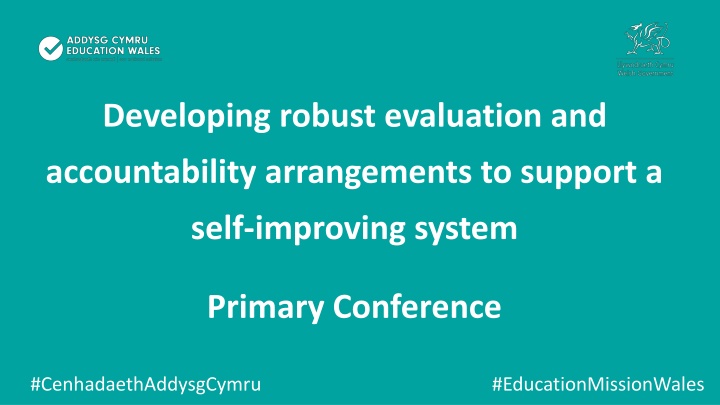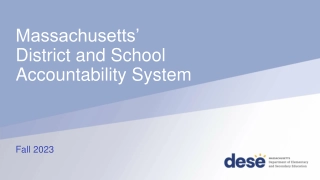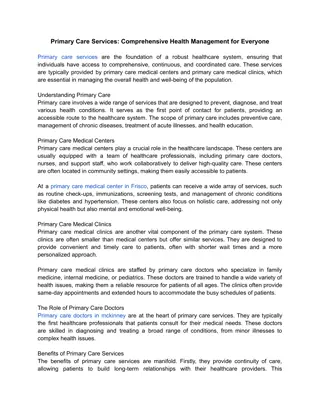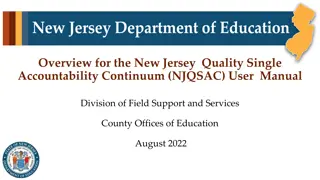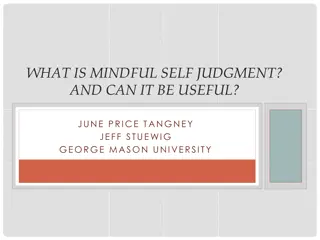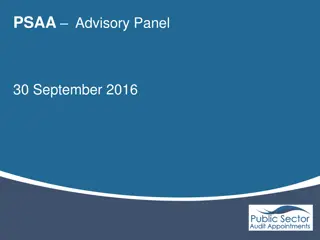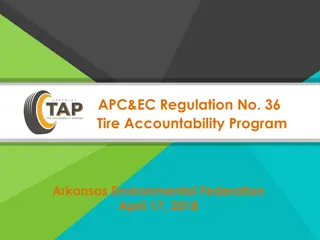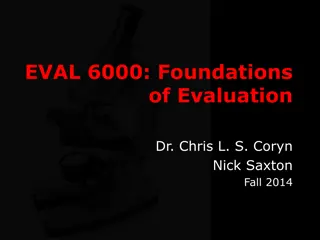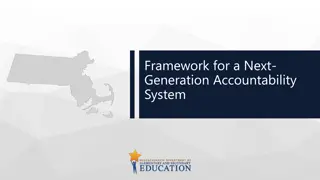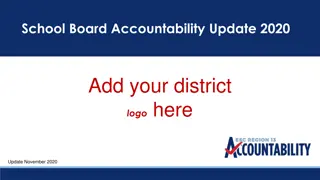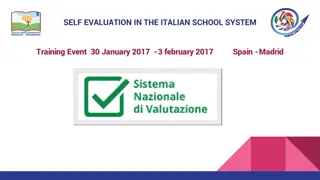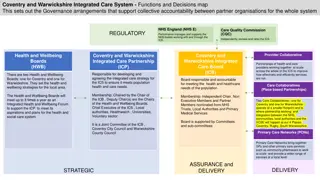Developing Robust Evaluation and Accountability Arrangements for a Self-Improving System Primary Conference
Explore the discussions and insights from the Primary Conference focusing on reforming evaluation and accountability arrangements in education systems. Addressing challenges, lessons from global collaborations, and key questions for effective assessment. Emphasizing the importance of clear purposes and overall consequences for sustainable improvements.
Download Presentation

Please find below an Image/Link to download the presentation.
The content on the website is provided AS IS for your information and personal use only. It may not be sold, licensed, or shared on other websites without obtaining consent from the author.If you encounter any issues during the download, it is possible that the publisher has removed the file from their server.
You are allowed to download the files provided on this website for personal or commercial use, subject to the condition that they are used lawfully. All files are the property of their respective owners.
The content on the website is provided AS IS for your information and personal use only. It may not be sold, licensed, or shared on other websites without obtaining consent from the author.
E N D
Presentation Transcript
Developing robust evaluation and accountability arrangements to support a self-improving system Primary Conference #CenhadaethAddysgCymru #EducationMissionWales
Welcome and introductions Olwen Corben Headteacher of Ysgol Llanarmon Dyffryn Ceiriog, Ysgol Cynddelw and Ysgol Pontfadog #CenhadaethAddysgCymru #EducationMissionWales
Reforming our evaluation and accountability arrangements scene setting Steve Davies Welsh Government #CenhadaethAddysgCymru #EducationMissionWales
Assessment and Accountability What can we learn from other education systems? What are the key challenges around implementation? Dr. Steve Munby CBE #CenhadaethAddysgCymru #EducationMissionWales
Atlantic Rim Collaboratory A global group of educational systems committing to advancing equity, excellence, well-being, social justice and human rights for all students within high quality, professionally-run systems. Finland Iceland Sweden Ontario California Vermont Ireland Scotland Wales
The Six Questions for an Assessment and Accountability System Is it reliable? Is it valid? Is it fair? Are the purposes clear? (there is a need for big data and for small data) Are there unintended consequences? Is it worth the effort?
The importance of thinking about overall consequences -the whole eco-system Given a set of criteria .a policy or program is said to be systemically valid if it results in improvements in one or more valued criteria, but without causing significant deterioration in other valued criteria . (Braun & Kanjee, 2006)
Lessons Learned from ARC Summit 2017 Be clear about the difference in purpose and function between: accountability systems how schools and systems keep track of standards and benchmark how teachers use assessment diagnostically in the classroom. progress. Both big data and small data have their place. Big data has limited use on its own. Use small data to help to explain issues raised by big data. Peer review, lesson study, joint action research and school self-evaluation can be very good ways to use small data (and big data) effectively.
Lessons Learned from ARC Summit 2017 Consider how to use sampling to monitor overall standards and to inform policy and resource allocation. When designing an accountability system, involve teachers and school leaders. Identify potential negative consequences and work with all stakeholders to try to minimise negative consequences, as well as to develop ownership.
Lessons Learned from ARC Summit 2017 Consider use of a balanced score card or report card for accountability purposes that recognises and values the wider purposes of schools (eg well-being, global competencies). Systems need to ensure that there is both credible accountablity and improvement/capacity building.
The Seven Aspects of Change Management 1. Perceived need (or burning platform) 2. Compelling narrative 3. Invitation to participate and to help to shape the change (ongoing) 4. A clear strategy focusing on impact. 5. Peer support and pressure 6. Resource and capacity-building (time, professional development, mentoring) 7. Consequences if the change is ignored.
Five key aspects of an effective accountability system 1. Collaborative design (addressing key purposes, workload/bureaucracy, unintended consequences and realistic timelines). 2. Incentify school to school collaboration. 3. Recognise and celebrate sustainable outcomes rather than quick wins . 4. Address capacity-building.
Too often the end result of high stakes external accountability is: exhausted, discouraged teachers and leaders, stretched on the rack of contract accountability but not given the capacity the time, resources or support to make any of this really work. Policymakers are left scratching their heads, wondering why change is so resistant to their will Steve Munby and Michael Fullan, Inside Out and Downside Up 2016.
Five key aspects of an effective accountability system 5. The need for ownership at local level. Leadership is crucial.
Leaders make the weather in their own context The idea is ..to change the game from compliance to purposeful focus. It is the responsibility of leaders to shape the culture and to ensure that although they take account of the external national accountability requirements, they develop an internal, collective accountability system that leads to the right outcomes? Steve Munby and Michael Fullan, Inside Out and Downside Up 2016.
Surveillance or Collective Accountability It is neither natural nor effective to motivate humans through surveillance The tools of a accountability are not instruments to be wielded but cultures to be built Michael Fullan
Kasserian Ingera How goes it with our children? Masai traditional greeting
Introduction to Professor Graham Donaldson Steve Davies Welsh Government #CenhadaethAddysgCymru #EducationMissionWales
Assessment, Accountability and Improvement Professor Graham Donaldson #CenhadaethAddysgCymru #EducationMissionWales
The challenge The introduction of the new curriculum will depend upon achieving a culture of collaboration and trust alongside a stronger focus on professional and organisational learning and a more constructive approach to how schools are accountable, including inspection. Taken together, these developments have major implications for systems of accountability and the role of Estyn and school inspection. Donaldson (2018) A LEARNING INSPECTORATE
Success in the new curriculum means Supporting all of our young people in developing the 4 purposes of A Curriculum for Wales Breaking the link between disadvantage and destiny Raising standards across the 4 purposes Establishing a progressive line of sight in learning 3-16+ and using assessment to support learning Promoting intrinsic satisfaction in learning what really matters and being ready to apply that learning throughout life purpose driven pedagogy Prioritising enhanced wellbeing
Estyn Review Terms of reference Purpose To identify the implications for Estyn of the educational reform programme in Wales and to make recommendations for its future role and operation. Objectives To outline the existing and potential contributions of the work of Estyn to the enhancement of quality in Welsh education within the context of a constructive accountability culture. To establish ways in which Estyn s contribution to improving the quality of Welsh education could be further enhanced. To outline implications for the future operational requirements of Estyn. To identify implications for the Welsh education system more widely. To consider whether an interim report could be provided by October 2017. To provide a report and make recommendations for the future role and operation of Estyn by early 2018.
What do we need from accountability and inspection? Timely evidence to enhance the learning of young people, teachers, schools and the system in relation to what really matters for realisation of the curriculum purposes. Empowerment of young people, teachers, schools and the system to pursue the best routes to the curriculum purposes. Consistency and alignment across all those involved in the learning process. Assurance that teachers, schools and the system are fulfilling their responsibilities to ensure that young people are progressing in their learning and achieving high standards
Issues Can we retain impact without the negative effects of high stakes ? What is the role of external inspection in a self-improving system? How far can/should assurance and improvement functions be combined? How mature is the education system in Wales?
A Learning Inspectorate Independent review of Estyn 1. Introduction 2. The current context of education in Wales 3. Estyn s current work: findings and issues 4. Estyn, inspection and education reform 5. Future school inspection 6. System-level evaluation 7. Wider implications 8. Conclusions 9. Recommendations 109 pages/27,000 words
Estyns Strengths High credibility for its independence and professionalism. Independent role in monitoring performance Setting expectations Identifying and sharing best practice Efficient, flexible and innovative organisation, leading the way in some aspects of inspection internationally. Its involvement in inspections of peer inspectors and nominees from the school were both cited in the Review evidence as real strengths of its current approach. These important strengths in its existing work provide a strong platform for necessary future changes to its role and practices.
Flexibility in Adding Value The scope of the educational reform programme will place very significant additional demands on all levels of the system for the foreseeable future. Unlike other UK countries such as Scotland and Ireland, Wales no longer has a national body to support curriculum development nationally and in schools. There is therefore a need for all of those organisations that relate to schools to ensure that they are playing their full part in supporting the reform process. It will be essential, therefore, for relevant national and local bodies, including Estyn, to provide such external support wherever they can.
Standards and Purposes The ultimate test of the reforms will lie in the extent to which the standards achieved by young people in relation to the four curriculum purposes and the quality of their learning are improved. To gauge success it will need to be very clear what is meant by standards of achievement. A narrow definition in terms of measurements of literacy, numeracy and numbers of qualifications will not reflect the full implications of the four curriculum purposes for young people s learning and wellbeing. On the other hand, vague claims about progress in relation to the purposes would not allow necessary rigour in the evaluation of the impact of the reforms. The development of a national evaluation and assessment framework will therefore require agreement and shared understanding about what successful reform will look like in terms of standards, valid measures and indicators.
New Inspection Arrangements Estyn has contributed directly and constructively to the current reform programme. Its new inspection arrangements signal a more responsive model of inspection. Amongst other improvements, inspectors are giving greater attention to teaching and learning and the school s responsiveness to innovation. The intention is to help schools to see inspection not just as an aspect of accountability but also as a learning experience. The current inspection arrangements represent an important step towards re-imagining inspection in the reformed education system.
Inspection Issues The Review identified a number of specific issues about the approach to school inspection in Wales. The currency of reports within a seven-year cycle of inspections Perceived inconsistency in inspectors judgements and Limitations arising from the short inspection window Although these specific concerns were by no means universal, nonetheless any new inspection arrangements should seek to mitigate their effects.
Perverse Effects of High-Stakes In recent years, Wales has introduced a number of measures designed to drive improvement in schools. These measures include the introduction and publication of test results, colour-coded categorisation of schools and targets relating to national qualifications. This high stakes approach can address specific shortcomings but it can also limit development and does not sit well with the kind of creative, self-improving system being promoted in the current reforms.
Summative Grading and High-Stakes Effects Inspection has come to be an important element in this high-stakes culture. There are concerns, supported by research evidence, that in such a culture inspection can inhibit improvement and innovation if schools try to second guess what inspectors want to see. Graded inspection reports and follow-up categories reinforce the association of inspection with an externally driven approach to improvement and can distort some schools practices to the detriment of their pupils.
Inspection and Reform The Welsh Government s aspiration to have a self-improving system with a learning culture means less direction from the centre and more freedom and responsibility for schools and practitioners. Collaboration within, between and beyond schools will be central to the new ways of working. External evaluation, particularly inspection, will need to evaluate progress with the reforms and also, importantly, support these essential features of the reformed system.
Inspecting What Matters The success of the educational reform programme will be strongly influenced by Estyn s ability to use inspection to promote changes in practice and behaviour. Inspection needs to evaluate the ways in which the new curriculum purposes are changing practice in schools, raising standards across the four curriculum purposes, improving the quality of the learning experience of all children and young people in all sectors and addressing children s health and wellbeing. The impact of new curriculum structures, changes in assessment and purpose- driven teaching and learning will all pose challenges for both schools and inspectors. Changes to inspection will need to evaluate these and other changes, giving assurance about standards and the quality of the learning experience of all pupils.
Assurance and Improvement Dynamic education systems are not driven solely or even largely by external forces of accountability. If improvement is to penetrate beyond defences put up against perceived external imposition then schools and teachers must themselves take greater control of and responsibility for the process. Assurance and improvement are not alternatives but essential and complementary parts of a dynamic education system.
Self Evaluation for Learning Self evaluation will play a major role in shaping the nature of the reforms school-by-school; in identifying how well the changes are progressing; and in providing evidence to build public confidence. Self evaluation must not be seen simply as an extension of accountability but as being integral to schools as learning organisations. Self evaluation should be forward looking, using a blend of quantitative and qualitative evidence to identify and understand current areas of strength and priorities for development. National developments in self evaluation, led by OECD and Estyn, should allow a deeper and more consistent approach to self evaluation to become established. Self evaluation must not become formulaic or burdensome and should fit naturally into the ways in which schools learn and improve.
External Perspectives External evaluation should complement self evaluation by providing a different and more objective perspective on the work of a school and its impact on learning. External evaluation can come from peer reviewers who are fellow professionals acting as critical friends to a school or cluster of schools. Estyn can play both formal and less formal roles as external evaluators. In addition to formal evaluation and reporting, inspectors could also operate more locally, thus allowing more regular contact with schools. The logic of the policy of self improvement and learning in Wales is for collaborative approaches to self evaluation to be developed involving trained peer reviewers, consortia staff and inspectors.
Inspection and Public Confidence The aim should be ultimately to establish an approach to accountability based on robust validated self evaluation. Assurance about how well individual schools are serving their pupils should continue to be central to Estyn s mission The unintended effects associated with the existing approach would be avoided in the changes to inspection proposed in this report. Inspectors constructive role in building capacity and supporting reform should be enhanced. Inspection should build public confidence that schools and the education system more generally are performing well and committed to their own improvement.
Phased Progress to Validated Self Evaluation (VSE) Moves towards validated self evaluation proposed in this report need to take account of schools confidence and competence in self evaluation as well as the demands on the system stemming from the reform programme itself. They should therefore be phased over a period that is consistent with progress with the wider reform programme. The aim would be to remove some of unintended negative effects of high-stakes inspection and reporting while retaining the level of robust assurance that is necessary for public confidence.
Enhanced Support for Reform from Estyn A first phase should involve the redirection of cyclical inspection towards direct support for the reform programme. A temporary suspension of the current inspection and reporting cycle should be used to allow inspectors to engage with schools, individually and in clusters, without the requirement to produce graded public reports. The engagement would have as its prime purpose the building of capacity for the school-by-school changes to the curriculum, learning and assessment. Benefits would accrue to both schools and inspectors. For schools, it would remove any distraction in their reform journey arising from inspection. They could also benefit from the support of inspectors during this period. For inspectors, it would allow a period to develop further their specialist curriculum expertise arising from the reforms and to engage directly with the reform process, both nationally and locally. A temporary redirection of Estyn s powerful resources would allow schools and inspectors to concentrate on reform.
Evaluation in Text The second, interim phase would have some significant differences from the existing inspection model: the focus of the inspections would be tailored to answer key questions about the school s progress with the reforms and the impact on children s experiences and outcomes; the evaluations would no longer be in the form of headline summative gradings but described clearly in the text. There would also be a stronger role for school self evaluation in arriving at judgements, in line with guidance emerging from the joint work on self evaluation involving OECD and Estyn. This phase would initiate the move towards validated self evaluation while retaining Estyn s vital role in giving assurance.
Earned VSE The third and final phase should be based on a validated self evaluation (VSE) model, consistent with the policy aspiration of moving to a self-improving system. As schools mature in their capacity to engage openly and constructively in self evaluation, the role of external individuals and bodies should be to provide perspectives that probe and extend internal judgements. Schools with a proven ability to conduct and act on self evaluation could move to a validation model of inspection on an earned autonomy basis. Estyn would engage directly with such schools on an agreed cycle in order to report publicly on its confidence in the self-evaluation process and the integrity of reports from schools. That confidence would be expressed in Estyn svalidation (or not) of the school s processes and findings, possibly described through a short narrative expressing the inspectors degree of confidence in the process. A move to a validated self evaluation model of accountability would reflect the broader aspiration to create a self-improving system based on professional and organisational learning.
Diagnostic Inspections Over the course of the move to the proposed 3-phase model, a number of features of Estyn s existing work would continue to be important. Schools that are currently in need of significant improvement or in special measures should continue to be subject to particular attention, although the nature of that attention will need to be reviewed. Estyn monitoring has already undergone some modification and its continuing implications for individual schools should be determined flexibly on a case-by- case basis. Schools identified as giving concern during any of the phases would receive an inspection designed to diagnose and help to address the issues of concern. The move to a new approach to school inspection should not detract from the current focus on those schools giving cause for serious concern. Diagnostic inspections of such schools would provide a more forensic basis for improvement.
More Flexibile Follow-Up Robust follow up in cases of serious underperformance remains necessary The process should be reviewed to allow better diagnosis of problems and greater flexibility in providing both support and challenge. In particular, the process should take account of the additional expectations for change that will be placed on the school by the curriculum reforms.
Strengthen Thematics Estyn s thematic and good practice work should continue or be strengthened. This aspect of Estyn s work was highly valued in the evidence to the Review and should make a significant contribution to collective learning about reform and its implications. As the reforms take shape, it will be even more important to establish a national picture of progress together with specific advice and examples of interesting practice.
System-Level Evaluation Estyn should make a stronger contribution to system-level evaluation. HMCI annual reports already inform a broad range of stakeholders about the performance of Welsh education as seen by inspectors. Their contribution to policy and practice would be enhanced if a wider body of evidence were brought to bear. A 3-yearly state of the nation report could provide an enhanced evidence base if included a more developed analysis of relevant research findings, survey results and the latest evidence from international experience, including PISA. System-level reporting by Estyn should be more targeted towards key current matters of policy and practice. In the next few years, for example, reports that specifically focused on progress with the reforms could make an important contribution to their success and inform the reform process.
Wider Accountability Changes to Estyn s role and to school inspection will require a review of the wider implications for other aspects of accountability in the system. It is essential that the accountability landscape captured in the proposed national evaluation and assessment framework should align purposes, responsibilities and procedures across national and local bodies. The framework should provide necessary assurance while avoiding the negative unintended consequences than can accompany high stakes measurement.
Underlying messages about inspection, accountability and improvement Be true to the purposes of Curriculum for Wales Provide independent perspective based on evidence Enhance quality and standards Enhance the quality of the learning experience Empowerment and responsibility in schools Enable not simply label Value qualitative judgement by professionals and of learning Learning culture throughout the educational and political community self evaluation for learning Be willing to examine established beliefs and habits Different but enhanced role for Estyn
Report Messages An enhanced role for Estyn in providing evaluation and support at the school, local authority, regional, and national levels. Mobilisation of Estyn s resources to kick-start reform with an initial short pause in the inspection cycle to allow inspectors and schools to work together on the reforms. Increased responsibility for schools to evaluate their own performance with confirmation of the quality of that self evaluation by Estyn. More informative inspection reports with rounded evaluations replacing summative grades. More tailored focus on schools causing concern with diagnostic inspections providing better insights into necessary changes. Timely evaluation of progress with reforms nationally through thematic reporting and a three-yearly state of the nation HMCI Report. Further entrenching Estyn s independence. Need for alignment across the accountability landscape.
Tea and coffee www.gov.wales/curriculumforwales #CenhadaethAddysgCymru #EducationMissionWales
